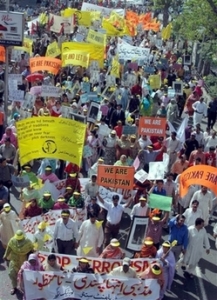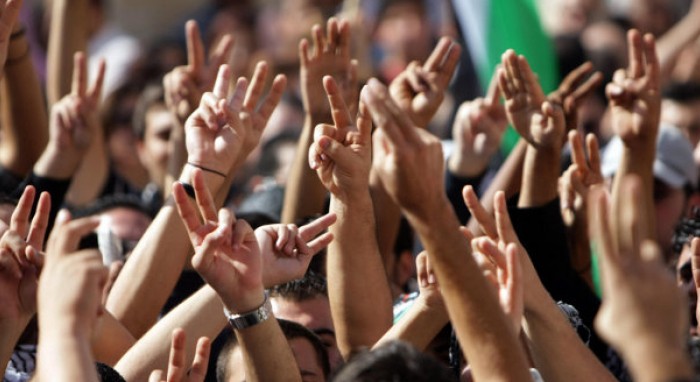Zinda dilaan-e-Lahore say no to Talibanisation, reports Raza Rumi

Never before have we citizens been traumatised with an uncertain future and the knocks of destruction at our door as is the case in the year 2009. The celebrated twenty first century has, if nothing else, blown the contradictions of Pakistani society and state right into our faces. One hundred and eighty million people cannot be spectators to the imperial great games and a callous state that gropes in the dark trying to locate the ‘enemy’ outside, instead of looking into its own crevices and cracks.
Not that Lahore has been a haven of peace in recent years – the inequities, the crime levels have been on the rise. However, March 2009 witnessed two full-scale terror attacks in the city of gardens, shrines and a centuries-old tolerant culture. Media gurus were quick to involve India, RAW, the Americans, everyone under the sun except the enemy within. First the friends of Pakistan – the Sri Lankans and then the ill-equipped and vulnerable Police Academy at Manawan, were attacked by trained assassins who espouse a version of Islam that no sane Muslim can ever live with.The panic and fear generated by these two incidents had not ended when the brutal video of Chand Bibi getting lashed on the streets of Swat was released. The anger and helplessness of citizens found a new dimension. Tired of resisting the state for the restoration of judges, civil society on April 4 was back on the streets of Lahore. The day chosen for this protest was also symbolic, as it was the dark day of our collective consciousness, when Pakistan’s first elected prime minister Zulfiqar Ali Bhutto was hanged and General Zia ul Haq sowed the seeds of an ideology that doomed a splintered nation.
The historic Mall Road was the venue for this rally of civil society organisations, political parties, students and a large number of citizens who made their presence felt even when the enemy within was preparing to bomb Islamabad the same evening and Chakwal the following day. It takes a good measure of courage to stand in unguarded public spaces and chant slogans that sum up the sorry state of our tragic affairs. As we walked towards Charing Cross on the beautiful Mall, the historic buildings on both sides felt the reverberations of echoes to end terrorism:
Dehshatgardi – band karo!
Mullahgardi – band karo!
Koray maarna – band karo!
Yeh sub badmashi – band karo!
The marchers were carrying banners and placards against the forces that were unleashing a reign of terror in the name of Islam. The air resounded with angry slogans: “Taliban – haivan! Taliban – shaitan!” Chand Bibi and scores of girls in Swat and elsewhere should know that the citizenry of Pakistan is alive. Beleaguered and faction-ridden it might be, but silent it is not.
The rally had been organised by a motley group of citizen bodies led by the Human Rights Commission of Pakistan. This is why HRCP’s chairperson Asma Jahangir led the rally and, in her inimitable style, demanded that civil society show its strength on The Mall because our rulers had surrendered to the Taliban; and the people of Pakistan were now at the mercy of barbarians. “We have come here to announce that women in Pakistan will not allow the Taliban to terrorise them”, she said in a defiant tone. “The government has repeatedly been telling us to avoid taking out processions, but we cannot be silent,” she added.
In her impassioned speech she spoke of the Swat Sharia deal and how it was a farce; emphasizing that, “we will not allow Pakistan to become a graveyard.” Hundreds joined in when Asma Jehangir and other women chanted these slogans:
Yeh aurat kay qatil – beghairat!
Yeh behn kay qatil – beghairat!
Yeh beti kay qatil – beghairat!
Yeh maa ka qatil – beghairat!
Lahore’s luminaries who have struggled for decades against state excesses were present in large numbers. Among others, marching on the Mall there was the legendary IA Rehman, the gutsy Hina Jilani, the indefatigable artist-activist Saleema Hashmi, thespians Samina Peerzada and Usman Peerzada, educationists Sonu Rehman and Shaista Sirajuddin from the celebrated Sondhi family, and the flower of Lahore’s intelligentsia. There were captains of industry like Dr Akmal Hussain and Sikandar Khan, rights activists like Khawar Mumtaz and Nighat Saeed Khan.
There were many fathers and daughters who had come together to voice their opposition to the barbarians who are at our gates. Every individual who took part in the rally was aware of the issue; every one was fired up; in every heart there burned a desire to be free of terrorism and the nightmarish descent into chaos that is the promise of the Taliban. There were more than a thousand such people on Lahore’s Mall on April 4.
Fiery speeches and emotive slogans filled the spring air. Interestingly, right opposite the Punjab Assembly and under the huge banners congratulating the PML-N on a successful long march against ‘baatil’, the public chants were animated, and dare I say, bold as never before.
Punjabi’s colourful idiom, evolved over the last seven centuries since Baba Farid gave a new voice to the people of this region, encompasses a range of meanings. Thus the loud catchphrases – Bhukhhay mar gaye mein tay tu/Lut kay lay gya GHQ were heard loud and clear. Many a passerby waved at the crowd who dared to defy the regime of terror imposed by extremist forces.
Political parties and lawyers were conspicuous by their thin, almost negligible presence. A few PML-N workers were present. PPP’s Ghulam Abbas was also there, and he was quick to remark that terrorism started in Pakistan after Zia killed Zulfiqar Ali Bhutto. The obscurantist forces since then have been making inroads into Pakistani society and were now unleashing terror in the name of Islam. The soft-spoken Dr Mehdi Hasan also saw this as the beginning of a long resistance against extremist militants who only knew savagery and murder. HRCP co-chairperson Iqbal Haider warned the naive leaders and their followers who consider the Taliban Pakistan’s frontline defenders. Such misplaced analyses were akin to living in a fool’s paradise, Haider said. Pakistan’s Left, or what is left of it, was there in force. Labour Party’s Farooq Tariq was at the forefront and claimed that by organizing this rally, the people of Lahore had kick-started a struggle against the Taliban who were historical lackeys of America and the Pakistani establishment. Thus the slogans raised by the charged participants reflected a worrying expression: Punjab Police – hero, hero!/Pak Fauj – zero, zero!
My dear friend Haris Khalique had come all the way from Islamabad with his colleagues and made his presence felt in no uncertain terms. Others had also joined in from the smaller provinces: Yousaf Baloch from Balochistan, Sher Muhammad from Swat and Parveen Soomro from Sindh were prominent among those who had traveled to Lahore to express their solidarity. Islamabad’s daring civil society activist Tahira Abdullah was also present to support her Lahori comrades. It was truly an awakening of the people – from across cultural, provincial, political and even linguistic divides, Pakistanis, as a whole. A group of concerned citizens was doing what is their duty in dark times like these – giving voice to the silent majority that sits cowering in its hovels or houses, mohallas or suburbs, terrified at Pakistan’s descent into chaos.
What really warmed my heart was to see young activists, some of whom I know by their dedicated writings and activism. Umer Chauhdry from the CMKP related how this demonstration was a fresh start. “Most people in Pakistan love to hate the external enemy but are in constant denial about the enemy within our state and society and their general acceptability. This has to change”, he said. Umer and his friends were clear: “We need to believe in people and organise more events to motivate citizens against extremism and decadence. History has offered us a challenge. We need to rise to the occasion”.
Another young activist, Ziyad Faisal remarked: “After all, ours is a generation which grew up hearing horror stories from the Zia era, and of daily floggings, beheadings and desecration of Afghanistan’s pre-Islamic past as the only news from Taliban-controlled Afghanistan. The hounds nurtured by Zia and his successors are on the prowl to destroy Pakistan”.
The multiplicity of voices was also impressive. At a remote corner of the wide boulevard, journalists registered their calm, business-like protest. Nearby, the hammer-and-sickle waved proudly with the gentle breeze, in the hands of young industrial workers. As Ziyad pointed out, “The pro-establishment religious right has been nurtured by the establishment. They have always been the arch-nemesis of workers and peasants and their organisations”. I recall his intelligent eyes, and while making sense of his nervous energy, I reiterate his words: “How will the Establishment reconcile their life-styles and requirements shaped by a permissive, widespread consumerism, with the unforgiving puritanism of the Taliban? They think they can control this Frankenstein. They are wrong. They will be devoured by it too.”
Ayeda Naqvi, writer and journalist carrying a placard reminded everyone how Pakistan was a nation of Sufis, not obscurantists. “Our Sufi roots go back to before the 10th century. The Taliban version of religion is barely a generation old; hate and exclusion are incompatible with Islam”, she added. I liked what Ayeda had to say, “I am here because I believe that we are all connected, whether we realize it or not. This unity of all beings makes a crime against a human being a crime against God”.
After listening to the younger generation, I was relieved. My cynicism and bouts of depression about the bleak future of Pakistan gave way to a faint hope that perhaps in the long run, the capture of Pakistan by the forces of darkness was not inevitable. Let the short term be their worry, but we shall fight. The country’s youth are cognizant of the grim reality that if they are the future of Pakistan, they must have a stake in the country’s potential. They understand that without Pakistan, they would face a loss of identity and purpose.
Pakistan’s security apparatus needs to take note of the fact that for right or wrong reasons, Pakistanis are not going to easily believe the doctored perceptions of the right wing media that trumpet American drone attacks as the only ‘reality’. The truth is that we are faced with organised barbarians who, increasingly in the public perception, are the creatures of a bloated, overambitious state.
Saturday’s demonstration and its clear condemnation of terrorism posed a clear challenge to the very Taliban project of subjugating and eradicating a pluralistic civilisation nurtured by Sufis, dervishes, bhagats and fakirs. The subcontinent is not a natural breeding ground for Wahhabism – it can only be imposed from above, as General Zia and his successors have tried to do. As Ziyad reminded me close to sunset on the Mall, “The one dimensional worldview of militant Wahhabism has been trashed here, even though our numbers are not as many as one would have hoped for, but it is a beginning.”
The diseased vision of Taliban ‘justice’ belongs to the dustbins of history. Thirty years after that cruel April day that eliminated Zulfiqar Ali Bhutto, Pakistan’s civil society has commenced a journey to save Pakistan and its plural culture.
First published in The Friday Times



